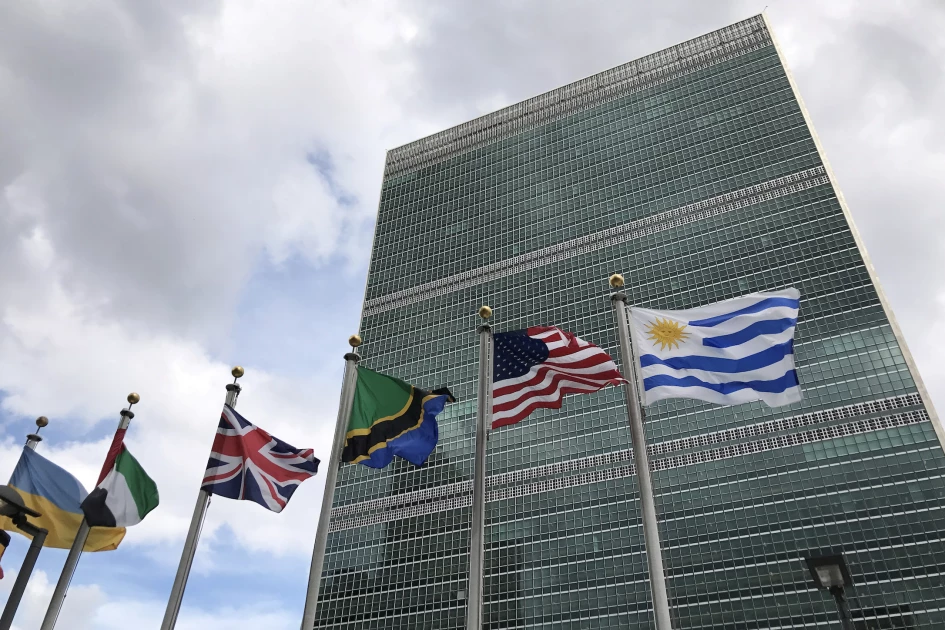Kenya plays lead role in landmark UN deal on AI governance

Flags at the United Nations headquarters in New York, United States. Photo I Reuters

Audio By Vocalize
Kenya has scored a major diplomatic win after all 193
United Nations Member States unanimously agreed to establish two landmark
institutions to govern artificial intelligence (AI).
Representing the Group of 77 and China, Kenya played a
pivotal role in negotiating the creation of the Independent Scientific Panel on
AI and a Global Dialogue on AI Governance, both designed to guide international
efforts on the opportunities and risks of artificial intelligence.
Both institutions aim to address growing concerns about
artificial intelligence's potential to disrupt economies, deepen inequalities,
and undermine democratic processes — while also unlocking innovation and
progress.
The G77 (Group of 77) is a United Nations coalition of
developing countries, currently including 134 member states, established in
1964 to promote their collective economic interests and enhance their joint
negotiating capacity within the UN system.
The historic decision follows six months of intense
negotiations at UN Headquarters in New York, culminating in a rare consensus at
a time when AI’s risks and opportunities dominate global policy debates.
UN Secretary-General António Guterres welcomed the outcome
as “a significant step forward” and noted that Kenya’s contributions helped
achieve rare unanimity on an issue at the intersection of technology, ethics,
and geopolitics.
The Independent Scientific Panel on AI will function as a
neutral, evidence-based body synthesising global research on AI’s
opportunities, risks, and impacts.
Modelled in part on the Intergovernmental Panel on Climate
Change (IPCC), it is expected to provide governments and international
organisations with authoritative assessments to guide policymaking.
The Global Dialogue on AI Governance will serve as a
multi-stakeholder platform, bringing together governments, industry leaders,
academia, civil society, and the UN system. Its mandate will be to strengthen
international cooperation, build trust, and explore shared principles for
governing AI in a safe, inclusive, and sustainable manner.
Ambassador Philip Thigo, Kenya’s Special Envoy on
Technology, who is also a member of the UN Secretary-General’s High-Level
Advisory Body on AI that originally proposed the institutions, hailed the
landmark deal, describing the experience as “enriching and challenging”.
“This consensus shows that even in a divided world, we can
come together to shape AI for the common good — guided by science, grounded in
cooperation, and inclusive of all nations,” said Ambassador Thigo.
Thigo emphasised the significance of Kenya’s role in
bridging the gap between developed and developing countries.
“The challenge was balancing ambition with inclusion —
ensuring that the Global South is not a spectator in the AI revolution, but a
key architect of its governance.”
Ambassador Thigo also paid special tribute to Tony Oweke of
Kenya’s UN Mission in New York, who led Kenya's delegation, for his
“outstanding leadership in steering negotiations to consensus.”
Oweke, who served as the G77’s lead negotiator, described
the process as “science guiding dialogue, and dialogue amplifying evidence into
cooperation.”
"The agreement reflects a growing recognition that AI
governance must be inclusive. Kenya’s leadership has reinforced the Global
South’s role in shaping emerging technologies and international digital
policy," reads a statement.
Similarly, Kenya’s Permanent Representative to the United
Nations, Ambassador Ekitela Lokaale, reflected on the delicate nature of the
talks, noting that negotiating across such diverse interests was not easy.
“Member States came with different priorities, levels of
technological advancement, and geopolitical concerns. Yet, through patience,
persistence, and Kenya’s bridge-building role, we were able to move from
division to consensus. This achievement shows what is possible when
multilateralism is given a chance,” he said.
Amb. Lokaale also expressed gratitude to his fellow
ambassadors across all regions of the UN who, “on many occasions, had to step
in at the political-diplomatic level to unlock stalemates whenever they
occurred in the course of the negotiations.”
Following the landmark decision, the UN will now begin
setting up the two institutions, with operational plans, membership frameworks,
and funding models expected to take shape in the coming months.
The first outputs from the Scientific Panel are anticipated
by 2027, while the Global Dialogue platform could be active by 2026.


Leave a Comment